Meet Adin, Hacarus’ Front-End and Android Developer! (An Introduction to Our Development Team in the Philippines)
Welcome to the Hacarus Global Blog! For the next series of interviews, I'll be interviewing Hacarus's development team in the Philippines! This time around I interviewed Adin, Hacarus's frontend and android developer.
Rikka: Hello Adin! It's nice to finally speak to you! By the way, congratulations on your graduation last June! How's life been after graduation?
Adin: For my last semester I had only one subject where we teach some students- high school students about mental health. I only go to school once a week so it’s really just the same after graduation.
Rikka: I've looked a bit into your background on LinkedIn so I'd like to ask you some questions about that! I read that you took a leave of absence for some time, since life is full of decision making and placing bets, I'd like to know what was it that inspired you to make that decision?
Adin: My family could only pay off 4 years of college tuition. I couldn’t finish all my subjects in 4 years, so I had to pay for the extended semesters. So, what I did was, after four years, I started working and then I enrolled every first semester, take a leave of absence the second semester and just did that repeatedly for 4 years until I graduated last June.
Rikka: When you took your leave of absence you went straight into developing, is that correct?
Adin: Yes. After my supposedly last semester in college, which was around 2013, I started applying for jobs. But it was hard, really hard being without a diploma because, some companies wouldn’t hire without diplomas. I was lucky to get a job that would take me, but the pay was really low- maybe 300 dollars a month. The typical starting pay for people with diplomas is around 500. From there, I just worked my way up.
Beginning from his family-run computer shop, computers have always been a part of Adin’s life and an inspiration to his career path in developing.
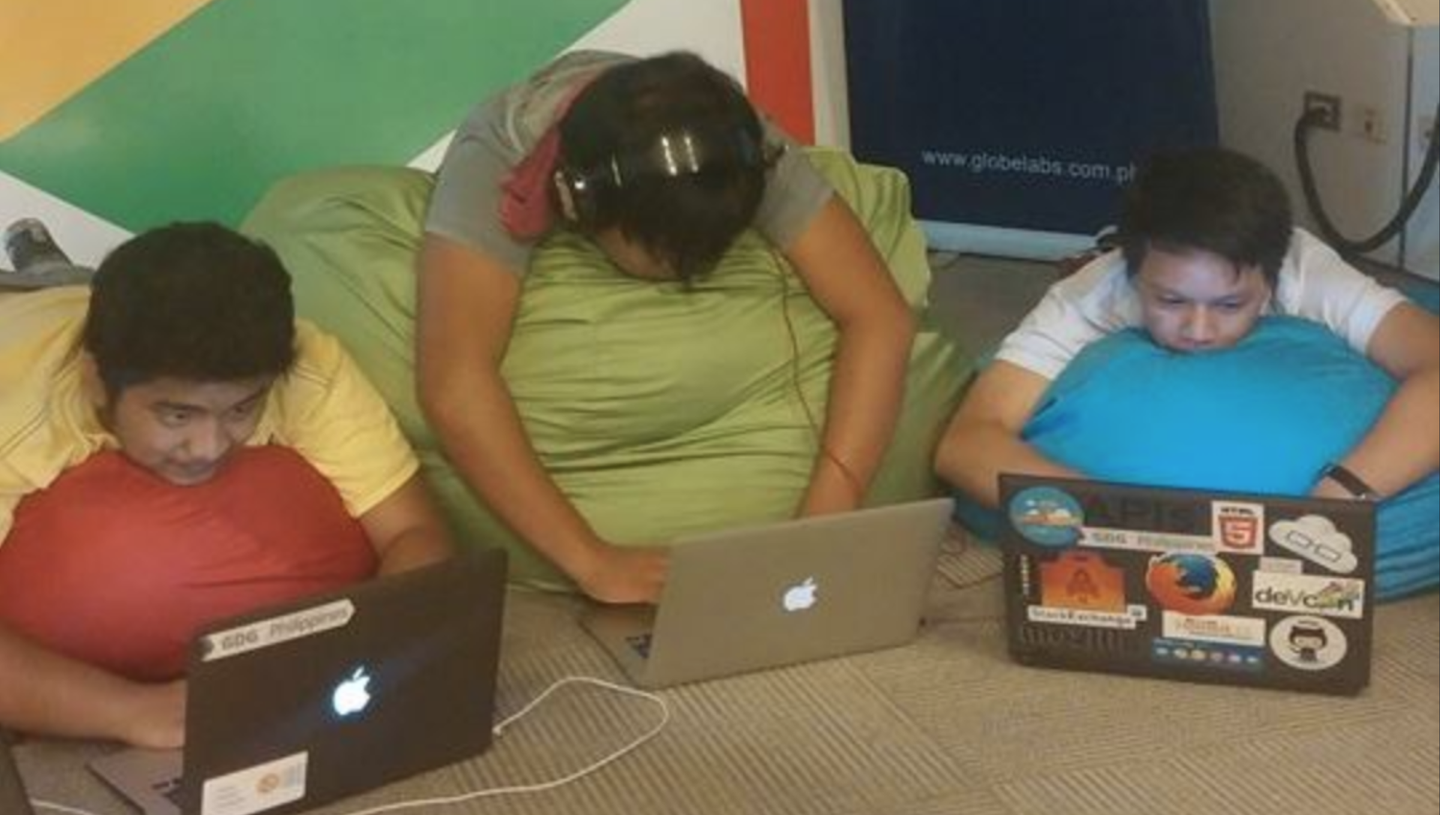
Rikka: What made you want to study computer science?
Adin: I think I just grew up with computers. Because when I was a kid, we had a computer shop back in my province in the Philippines. I think we were the first computer shop in the province, so I grew up with the computer from there. I think I was 3 or 5 years old, I already started encoding since typewriters were getting phased out. In high school, I had my first programming class and I got really hooked into programming. And then I became really into programming and decided to study computer science for college.
Rikka: It seems you have some experience outside of engineering, like consulting! Is that correct?
Adin: Yes. Well, it’s like a workaround with the employment regulations in the Philippines because the company is based in Hong Kong but with operations in the Philippines. Since they didn’t have a Philippine company, we couldn’t be employees but we had to look for a way they could hire us. But still, adhering to Philippine laws. The workaround was, on paper, we were consultants, but we did development jobs for them. Essentially, we were doing developing just as we do in Hacarus, just that our job title was listed as consultant.
During his leave of absence from school, he pursued his passion in development, learning and steadily accumulating his work experience to become increasingly skillful in coding.
Rikka: Can you tell me about the major projects you've had in developing?
Adin: Well, when I first started I don’t think I had any major projects. Well, there was this project called Agent Bridge but I wasn’t able finish before the completion of that project since I had already changed jobs. For my second project, there was this service called TheShopPH, are you familiar with Lazada? Shopify?
Rikka: Shopify, yes!
Adin: It’s like Shopify but it’s targeted towards the Philippine market. I think that was my first major project because it’s partnered with LBC. I’m unsure if you’re familiar with LBC, but they are a big company that does shipping etc. I think that was my first major project. And then I did an android app for a stockbroker in the Philippines before as well. I got into web programming after some time and also started doing frontend developing since Ninz was doing backend and server work.
Rikka: Were you doing a lot of coding during university as well?
Adin: In university, we were taught algorithms, data structures, machine learning, programming languages, theoretical and basic level foundations of computer science which later was up to us to go into a specified branch of computer science.
Rikka: Did you do a lot of first-hand coding application?
Adin: Ninz, I, and Tin- the Philippines development team, already in college we were working together doing programming like maintaining systems. Our mentor started his own company, so he had us as part-time developers. Tin and I did android development while Ninz did web programming. So, even in college I was doing client work, android apps, and programming work.
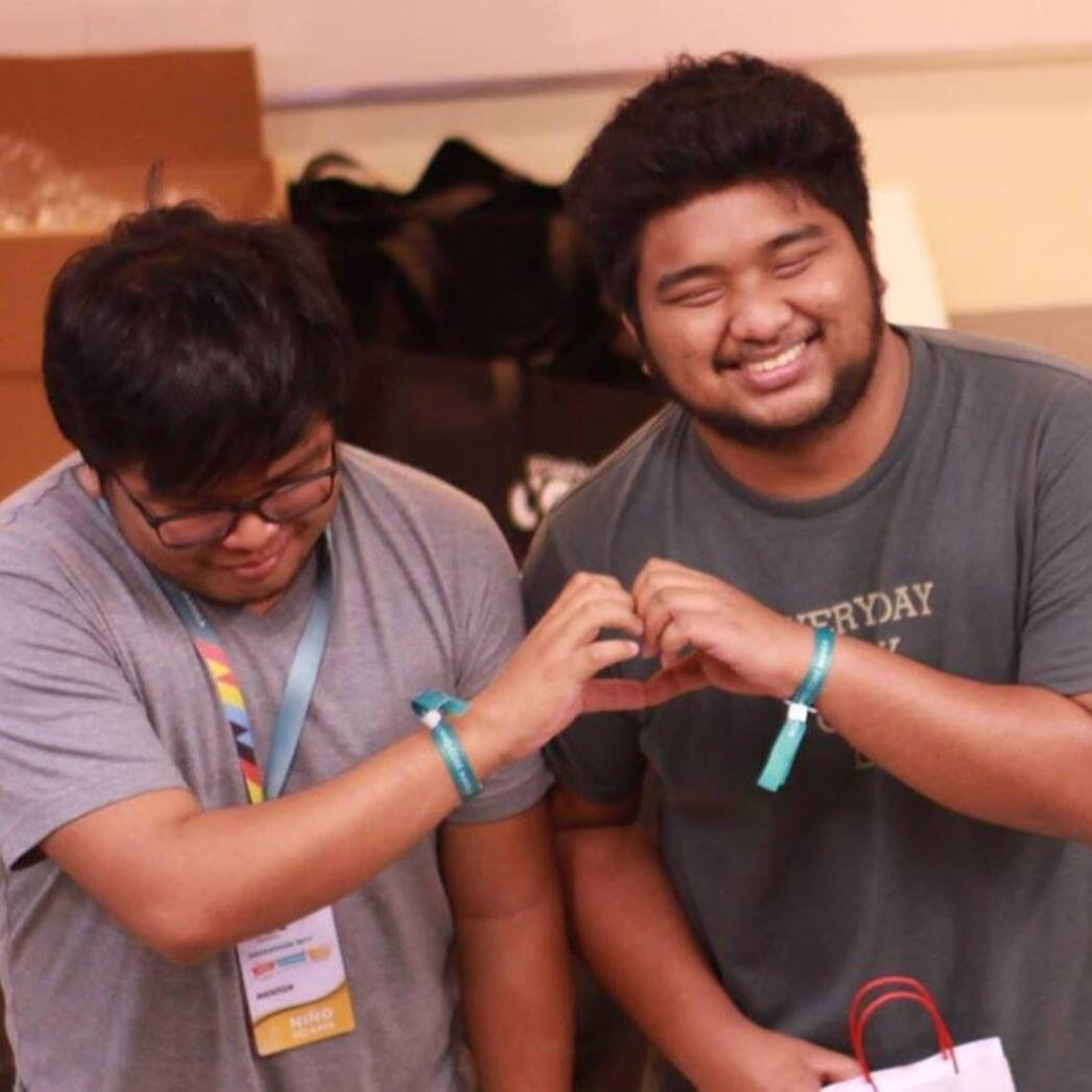
Ninz and Adin, when they mentored at a Hackathon
Rikka: Wow you were already doing client work as well! And you also worked with Ninz in another startup prior to Hacarus, is that right?
Adin: Yes. I worked there for two years.
Rikka: Was that the beginning of your interest in startup companies? Or were you not in particular interested in startups?
Adin: Well, not really. In the Philippines if you want to get a job and you don’t have a diploma, the entry point would be startups. But the company I was working for wasn’t a startup, it was an outsourcing company. The company after that was a startup that was working with web applications and mobile applications for startups. So they were technology partners for startups which brought me, Tin, and Ninz into the startup scene.
Rikka: So how did you come to know about Hacarus?
Adin: About Hacarus- oh! It’s Ninz. Ninz saw Hacarus and then said “do you want to apply here?”, I said “okay let’s apply”, and then we applied and got accepted.
Rikka: Was there anything that made you interested in Hacarus, after seeing the company website or talking to a Hacarus member- can you tell us what made you want to apply?
Adin: Firstly, it was because it was a remote job. After K-12 was implemented (where an additional two years is mandatory to add to your education history). If I didn’t graduate by 2018, I had to enroll my subjects in a high school setup so I really had to go to school again and do school for long periods of time so having a remote job is the best setup because I can stay in Laguna and then work after my classes. So that was what first got me interested. My second reason was because it was a healthcare company. It being a remote job also means that Ninz could go back to his place and live healthily. The same was for me because I could go to Laguna and get away from Manila.
Entering a new environment, a new company- a startup where achieving growth as developers is made possible.
Rikka: Can you tell me your responsibilities now at Hacarus?
Adin: I do Javascript and also android application and help out on iOS and backend. I’m much more focused on web and android applications.
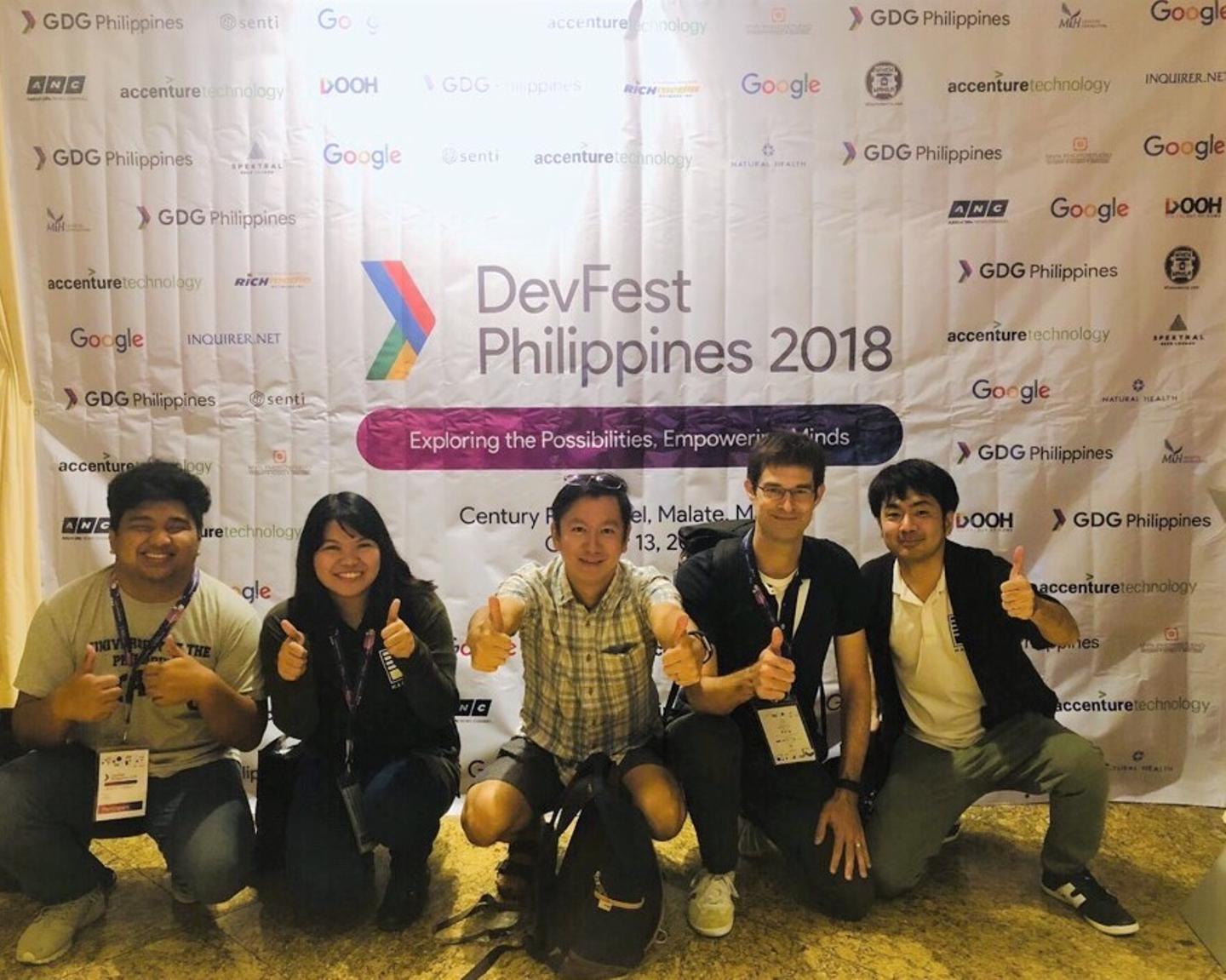
Adin, far left, with fellow developer Tin, CEO Kenshin, VP of Product Marcel, and CTO Takashi
Rikka: Do you have a favorite project you can tell us about in Hacarus? Something memorable to you?
Adin: I think the most interesting project we did at Hacarus was Pierrot, the baby project of Tomomi. I’m not sure if you know Pierrot, but it’s a slackbot that tells you to do exercises like say, every hour or two hours. It sends you a cute gif- it sends you Pierrot! I’ll send you Pierrot gifs later. It’s really interesting- it’s fun because you see Pierrot doing the exercises. That was the most interesting project I did.

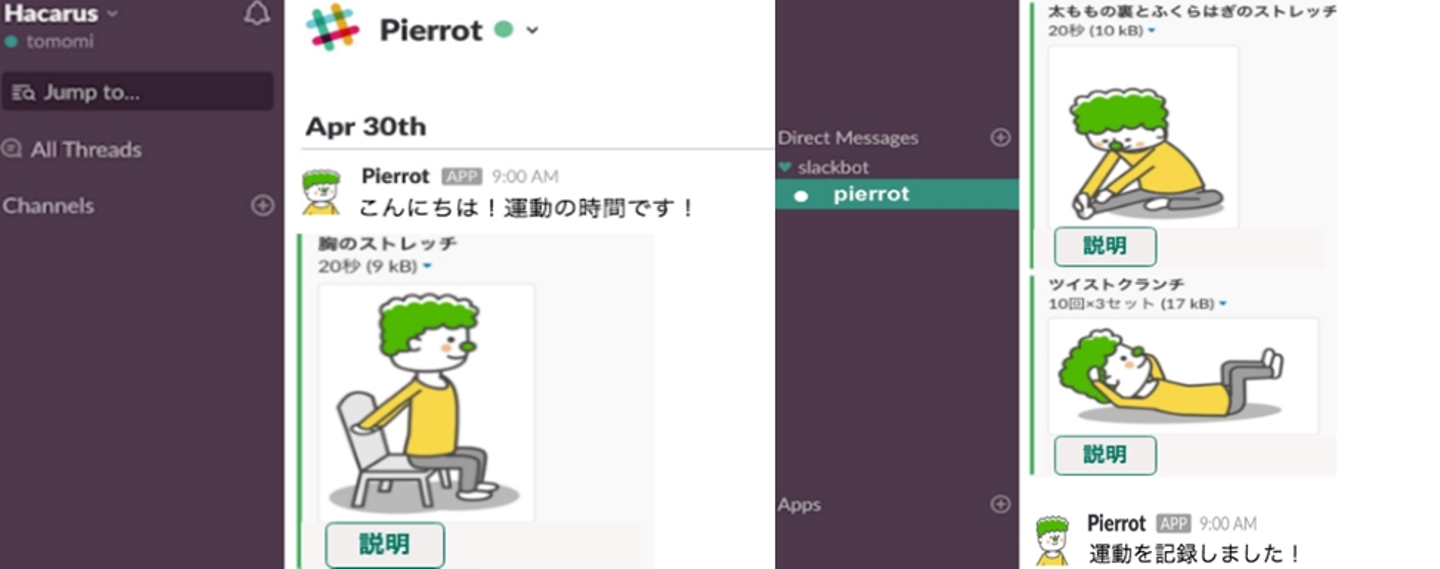
Pierrot, the exercising slackbot!
Rikka: For my final question, now that's it been over a year in Hacarus, can you tell me what you've found the most interesting, or anything that you've learnt?
Adin: It’s different from how we Filipinos look at Japanese companies. We generally think of Japanese companies or Japanese people as strict. In Hacarus, it’s a bit laxer, there aren’t any pressure (micromanagement), you just need to deliver what you promised. When we talk to Kenshin, outside the meeting room it’s fun and he’s just like a normal person. When we enter the meeting room, it’s a whole different person and we feel the CEO aura. It’s really interesting how he can do that. At the past job Ninz and I had, it was completely different and wasn’t the same case. It’s a fun working environment, they make us do our thing the way it should be done as long as we do it with their agreement. It really helps us grow as developers.
Rikka: I really feel you there! It’s fun when it needs to be and serious when it needs to be. Thank you so much Adin! It was really nice to talk to you and know more about you!
/assets/images/260916/original/3f3349c3-cad0-4ed8-8372-b191c2e08205?1519625354)
/assets/images/260916/original/3f3349c3-cad0-4ed8-8372-b191c2e08205?1519625354)
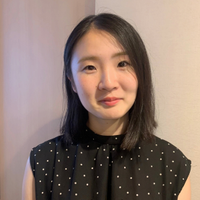

/assets/images/260916/original/3f3349c3-cad0-4ed8-8372-b191c2e08205?1519625354)
